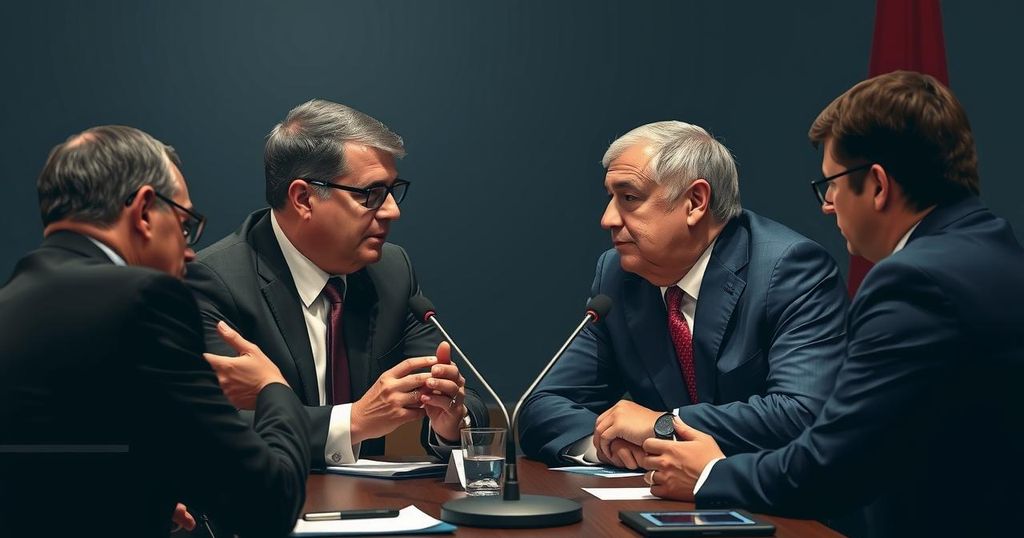COP29 Concludes with Controversial Climate Finance Agreement Amid Criticism
At COP29 in Baku, a consensus on climate finance was achieved after intense negotiations, yet it was met with immediate criticism from several countries for being insufficient. Despite Azerbaijan’s efforts to facilitate a smooth agreement, dissatisfaction centered around funding levels for emerging economies worse affected by climate change, prompting a complex dialogue regarding global climate responsibility.
Baku (AFP) – Following intense negotiations lasting three sleepless nights, a pivotal agreement on climate finance was reached at COP29, symbolized by the decisive strike of a gavel in Azerbaijan’s Olympic Stadium. However, the moment was quickly overshadowed by criticism and dissatisfaction voiced by multiple nations. Amidst a scorching year projected to be the hottest on record, discussions unfolded in a transformed venue marked by a series of tense deliberations.
Despite predictions of a timely conclusion, critical issues remained unresolved as the scheduled closure approached. Negotiators, urged into a final session well past midnight, were met with a proclamation from COP president Mukhtar Babayev that an agreement had been adopted at approximately 3:00 am on Sunday. The response from delegates varied; while some expressed enthusiasm, others, notably representatives from oil-rich nations like Saudi Arabia, remained neutral and composed.
Immediately after the announcement, several countries, including Cuba and India, took to the floor to express their discontent. India’s representative criticized the agreed-upon figure of $300 billion annually to be paid by affluent nations to developing countries as “abysmally low.” In her impassioned address, Chandni Raina voiced concerns that the consensus approach employed by Babayev neglected legitimate objections from various delegations. Acknowledging the discontent in the room, Babayev offered a stoic reply, thanking her for her statement.
Throughout the negotiations, India maintained a strong yet less visible presence compared to other countries. In a notable moment, John Podesta, a senior advisor to President Joe Biden, appeared to engage positively with Liu Zheng, a Chinese counterpart. Conversely, Panama’s Juan Carlos Monterrey Gomez, an advocate for equity in climate discussions, lamented the inadequate offerings of wealthy nations as mere “crumbs.” As the aforementioned session advanced, some delegates could be seen rushing to catch flights, highlighting the urgency of the negotiations.
Amid criticism of its leadership, Azerbaijan’s authoritarian regime publicly defended its successful orchestration of COP29, with President Ilham Aliyev initially attacking Western nations and extolling fossil fuels as advantageous resources. As the atmosphere shifted post-agreement, President Babayev acknowledged the skepticism surrounding Azerbaijan’s capacity to facilitate a successful negotiation, asserting, “People doubted that Azerbaijan could deliver. They were wrong on both.”
The negotiations at COP29 took place in Azerbaijan, a country notable for its authoritarian governance and reliance on oil and gas exports. The conference aimed to address urgent climate finance issues amid growing global concern over climate change, particularly as 2024 was bracketed to be one of the hottest years recorded. As delegates engaged in a test of diplomacy, significant dissent arose regarding the adequacy of the financial provisions implemented in the deal, demonstrating the complexities of international climate negotiations.
The COP29 climate talks in Baku concluded with a controversial agreement on climate finance, which sparked immediate backlash from several countries dissatisfied with the terms. The negotiations revealed deep fractures in global cooperation over climate action, highlighting the obstacles ahead in securing meaningful commitments. President Babayev’s leadership faced scrutiny, yet he celebrated Azerbaijan’s success in brokering the deal despite widespread criticism, emphasizing the challenges ahead in implementing climate finance effectively.
Original Source: www.france24.com




Post Comment